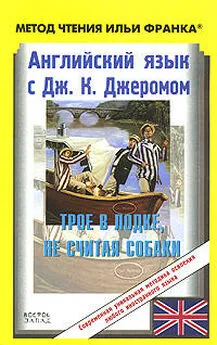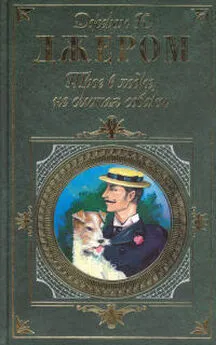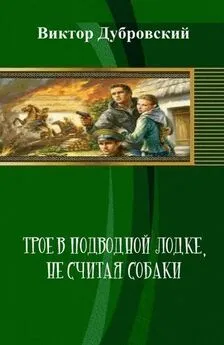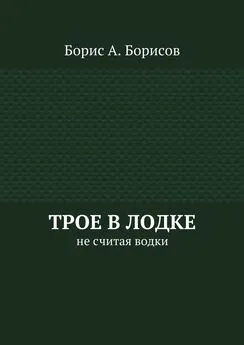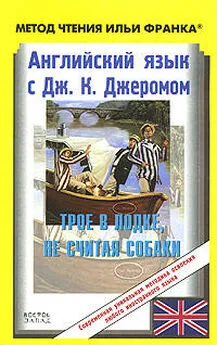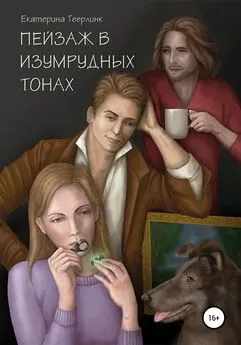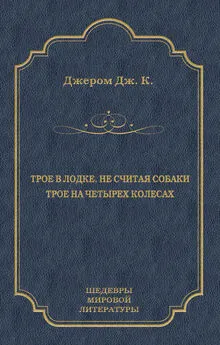Jerome Jerome - Английский язык с Джеромом К. Джеромом. Трое в лодке, не считая собаки (ASCII-IPA)
- Название:Английский язык с Джеромом К. Джеромом. Трое в лодке, не считая собаки (ASCII-IPA)
- Автор:
- Жанр:
- Издательство:неизвестно
- Год:неизвестен
- ISBN:нет данных
- Рейтинг:
- Избранное:Добавить в избранное
-
Отзывы:
-
Ваша оценка:
Jerome Jerome - Английский язык с Джеромом К. Джеромом. Трое в лодке, не считая собаки (ASCII-IPA) краткое содержание
Jerome K. Jerome. Three Men in a Boat (To Say Nonthing Of The Dog)
Джером К. Джером. Трое в лодке, не считая собаки
Текст адаптирован (без упрощения текста оригинала) по методу Ильи Франка: текст разбит на небольшие отрывки, каждый и который повторяется дважды: сначала идет английский текст с «подсказками» — с вкрапленным в него дословным русским переводом и лексико-грамматическим комментарием (то есть адаптированный), а затем — тот же текст, но уже неадаптированный, без подсказок.
Начинающие осваивать английский язык могут при этом читать сначала отрывок текста с подсказками, а затем тот же отрывок — без подсказок. Вы как бы учитесь плавать: сначала плывете с доской, потом без доски. Совершенствующие свой английский могут поступать наоборот: читать текст без подсказок, по мере необходимости подглядывая в подсказки.
Запоминание слов и выражений происходит при этом за счет их повторяемости, без зубрежки.
Кроме того, читатель привыкает к логике английского языка, начинает его «чувствовать».
Этот метод избавляет вас от стресса первого этапа освоения языка — от механического поиска каждого слова в словаре и от бесплодного гадания, что же все-таки значит фраза, все слова из которой вы уже нашли.
Пособие способствует эффективному освоению языка, может служить дополнением к учебникам по грамматике или к основным занятиям. Предназначено для студентов, для изучающих английский язык самостоятельно, а также для всех интересующихся английской культурой.
Мультиязыковой проект Ильи Франка: www.franklang.ru
От редактора fb2. Есть два способа оформления транскрипции: UTF-LATIN и ASCII-IPA. Для корректного отображения UTF-LATIN необходимы полноценные юникодные шрифты, например, DejaVu или Arial Unicode MS. Если по каким либо причинам вас это не устраивает, то воспользуйтесь ASCII-IPA версией той же самой книги (отличается только кодированием транскрипции). Но это сопряженно с небольшими трудностями восприятия на начальном этапе. Более подробно об ASCII-IPA читайте в Интернете:
http://alt-usage-english.org/ipa/ascii_ipa_combined.shtml
http://en.wikipedia.org/wiki/Kirshenbaum
Английский язык с Джеромом К. Джеромом. Трое в лодке, не считая собаки (ASCII-IPA) - читать онлайн бесплатно полную версию (весь текст целиком)
Интервал:
Закладка:
cemetery ['semItrI] vault [vO:lt] eight [eIt]
He said:
"Yuise a stranger in these parts? You don't live here?"
"No," I said, "I don't. You wouldn't if I did."
"Well then," he said, "you want to see the tombs — graves — folks been buried, you know — coffins!"
"You are an untruther," I replied, getting roused; "I do not want to see tombs — not your tombs. Why should I? We have graves of our own, our family has. Why my uncle Podger has a tomb in Kensal Green Cemetery, that is the pride of all that country-side; and my grandfather's vault at Bow is capable of accommodating eight visitors, while my great-aunt Susan has a brick grave in Finchley Churchyard, with a headstone with a coffee-pot sort of thing in bas-relief upon it, and a six-inch best white stone coping all the way round, that cost pounds. When I want graves, it is to those places that I go and revel. I do not want other folk's. When you yourself are buried, I will come and see yours. That is all I can do for you."
He burst into tears (он залился слезами; to burst into — внезапно или бурно начинать что-либо) . He said that one of the tombs had a bit of stone upon the top of it (он сказал, что на одной из могил лежит кусок камня) that had been said by some to be probably part of the remains of the figure of a man (который, /как/ некоторые говорят, возможно, является частью развалин изображения человека; remains — остатки, развалины; figure — фигура, изображение, статуя) , and that another had some words, carved upon it (а на другой какие-то выгравированные слова) , that nobody had ever been able to decipher (которые никто еще не мог разобрать/расшифровать) .
I still remained obdurate (я по-прежнему оставался непреклонным) , and, in broken-hearted tones, he said (и сокрушенным тоном он сказал; broken-hearted — убитый горем; с разбитым сердцем) :
"Well, won't you come and see the memorial window (может, пойдете посмотрите мемориальное окно) ?"
I would not even see that, so he fired his last shot (я не согласился посмотреть даже его, поэтому он /старик/ выпустил свой последний заряд) . He drew near, and whispered hoarsely (он подошел ближе и прошептал хрипло; to draw near) :
"I've got a couple of skulls down in the crypt (у меня пара черепов внизу, в склепе) ," he said; "come and see those. Oh, do come and see the skulls! You are a young man out for a holiday, and you want to enjoy yourself (вы молодой человек в отпуске, и хотите получить удовольствие) . Come and see the skulls (идите посмотрите черепа) !"
decipher [dI'saIf@] obdurate ['Obdjur@t] memorial [mI'mO:rI@l]
He burst into tears. He said that one of the tombs had a bit of stone upon the top of it that had been said by some to be probably part of the remains of the figure of a man, and that another had some words, carved upon it, that nobody had ever been able to decipher.
I still remained obdurate, and, in broken-hearted tones, he said:
"Well, won't you come and see the memorial window?"
I would not even see that, so he fired his last shot. He drew near, and whispered hoarsely:
"I've got a couple of skulls down in the crypt," he said; "come and see those. Oh, do come and see the skulls! You are a young man out for a holiday, and you want to enjoy yourself. Come and see the skulls!"
Then I turned and fled, and as I sped I heard him calling to me (тут я развернулся и побежал, а на бегу слышал, как он кричит мне; to flee — убегать, спасаться бегством; to speed — спешить; мчаться) :
"Oh, come and see the skulls; come back and see the skulls (вернитесь и посмотрите черепа) !"
Harris, however, revels in tombs, and graves (Гаррис однако упивается /видом/ гробниц, могил) , and epitaphs, and monumental inscriptions (эпитафий и надписей на памятниках) , and the thought of not seeing Mrs. Thomas's grave made him crazy (и от мысли, что он не увидит могилу миссис Томас, он обезумел) . He said he had looked forward to seeing Mrs. Thomas's grave from the first moment that the trip was proposed (он сказал, что ожидал с нетерпением/предвкушал /возможность/ увидеть могилу миссис Томас с первой минуты, когда предложили путешествие) — said he wouldn't have joined if it hadn't been for the idea of seeing Mrs. Thomas's tomb (сказал, что не присоединился бы /к нам/, если бы не намерение увидеть могилу миссис Томас; if it were not for — если бы не) .
I reminded him of George (я напомнил ему о Джордже) , and how we had to get the boat up to Shepperton by five o'clock to meet him (и о том, что нам нужно привести лодку в Шеппертон к пяти часам, чтобы встретить его) , and then he went for George (и тут он /Гаррис/ принялся за Джорджа) . Why was George to fool about all day (почему Джордж должен болтаться без дела весь день) , and leave us to lug this lumbering old top-heavy barge up and down the river by ourselves to meet him (а нам предоставляет таскать эту громоздкую старую перегруженную баржу = лодку вверх и вниз по реке, чтобы встретить его; top-heavy — неустойчивый; перевешивающий в своей верхней части) ? Why couldn't George come and do some work (почему Джордж не мог прийти и выполнить какую-нибудь работу) ? Why couldn't he have got the day off, and come down with us (почему он не мог взять выходной и отправиться с нами) ? Bank be blowed (будь проклят этот банк; to blow — веять, дуть /о ветре/; взрывать) ! What good was he at the bank (какой прок от него /Джорджа/ в банке) ?
tomb [tu:m] epitaph ['epItA:f]
Then I turned and fled, and as I sped I heard him calling to me:
"Oh, come and see the skulls; come back and see the skulls!"
Harris, however, revels in tombs, and graves, and epitaphs, and monumental inscriptions, and the thought of not seeing Mrs. Thomas's grave made him crazy. He said he had looked forward to seeing Mrs. Thomas's grave from the first moment that the trip was proposed — said he wouldn't have joined if it hadn't been for the idea of seeing Mrs. Thomas's tomb.
I reminded him of George, and how we had to get the boat up to Shepperton by five o'clock to meet him, and then he went for George. Why was George to fool about all day, and leave us to lug this lumbering old top-heavy barge up and down the river by ourselves to meet him? Why couldn't George come and do some work? Why couldn't he have got the day off, and come down with us? Bank be blowed! What good was he at the bank?
"I never see him doing any work there (никогда не видел, чтобы он делал какую-нибудь работу там) ," continued Harris (продолжал Гаррис) , "whenever I go in (когда бы я ни заходил) . He sits behind a bit of glass all day (он сидит за стеклом весь день) , trying to look as if he was doing something (пытаясь выглядеть = сделать вид, будто что-то делает) . What's the good of a man behind a bit of glass (какая польза от человека за стеклом) ? I have to work for my living (я должен зарабатывать на жизнь) . Why can't he work (почему он не может работать) ? What use is he there, and what's the good of their banks (какой от него там толк, и какая польза от их банков) ? They take your money, and then, when you draw a cheque (они берут ваши деньги, а потом, когда вы выписываете чек) , they send it back smeared all over with `No effects,' `Refer to drawer (они отсылают его назад, весь исписанный /надписями/ «нет средств», «обратитесь к чекодателю»; to smear — мазать толстым слоем; марать) .' What's the good of that? That's the sort of trick they served me twice last week (этот фокус они проделали со мной дважды на прошлой неделе; to serve — обслуживать; поступать с, обходиться) . I'm not going to stand it much longer (я не собираюсь больше это терпеть) . I shall withdraw my account (я закрою свой счет; to withdraw — отбирать, отзывать, брать назад) . If he was here, we could go and see that tomb (если бы он был здесь, мы смогли бы посмотреть эту могилу) . I don't believe he's at the bank at all (я не верю, что он вообще в банке) . He's larking about somewhere, that's what he's doing (он забавляется = прохлаждается где-нибудь, вот что он делает) , leaving us to do all the work (а нам оставляет всю работу) . I'm going to get out, and have a drink (я собираюсь пойти выпить /чего-нибудь/) ."
"I never see him doing any work there," continued Harris, "whenever I go in. He sits behind a bit of glass all day, trying to look as if he was doing something. What's the good of a man behind a bit of glass? I have to work for my living. Why can't he work? What use is he there, and what's the good of their banks? They take your money, and then, when you draw a cheque, they send it back smeared all over with `No effects,' `Refer to drawer.' What's the good of that? That's the sort of trick they served me twice last week. I'm not going to stand it much longer. I shall withdraw my account. If he was here, we could go and see that tomb. I don't believe he's at the bank at all. He's larking about somewhere, that's what he's doing, leaving us to do all the work. I'm going to get out, and have a drink."
I pointed out to him that we were miles away from a pub (я обратил его внимание, что мы находимся на расстоянии /многих/ миль от трактира) ; and then he went on about the river, and what was the good of the river (и он набросился на реку: какая польза от этой реки) , and was everyone who came on the river to die of thirst (и /неужели/ всякий, кто отправился на реку, должен умереть от жажды) ?
Читать дальшеИнтервал:
Закладка:
